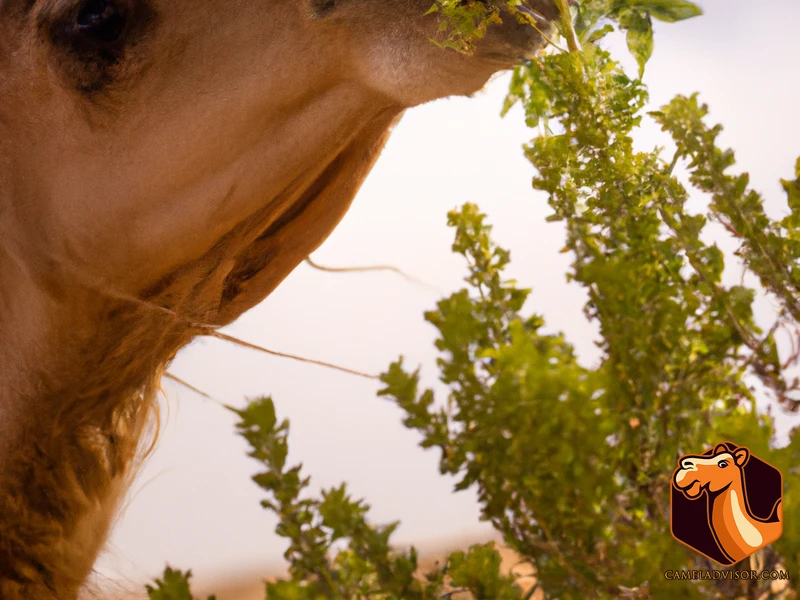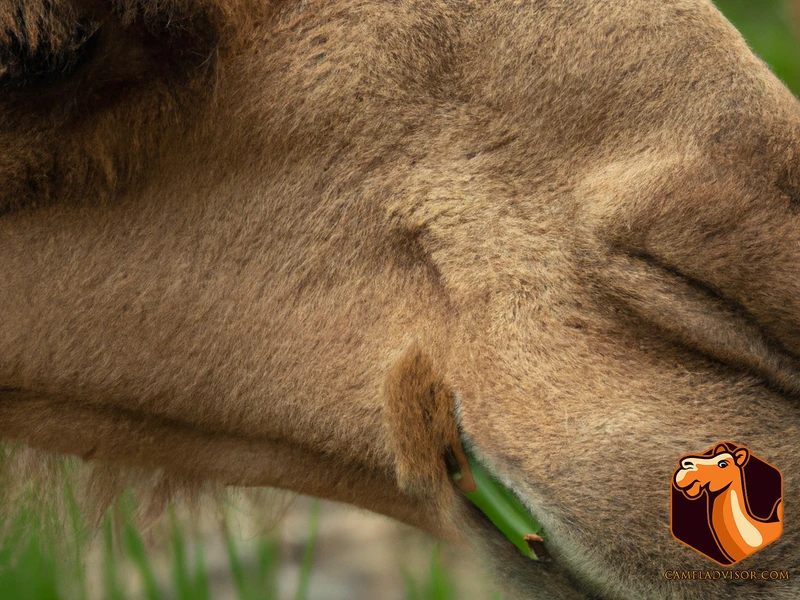Raising and caring for camels during pregnancy can be a challenging task. These large, majestic creatures require specific nutrition and health care to ensure a healthy pregnancy, birth, and newborn camel. From monitoring their diet and hydration to preventing parasites and managing stress, there are several critical steps to follow for successful pregnancy and aftercare. In this article, we will discuss essential tips for nutrition and health care during pregnancy, as well as the birthing process and aftercare for your pregnant camel. So, let’s dive in and learn everything you need to know to raise healthy, happy camels!
Contents
- Camel Nutrition during Pregnancy
- Health Care for Pregnant Camels
- Birthing Process and After Care
- Conclusion
-
Frequently Asked Questions
- What is the gestation period of a camel?
- Can camels experience complications during pregnancy?
- Is it important to provide a balanced diet to a pregnant camel?
- How much water should a pregnant camel drink?
- What are some signs of stress in a pregnant camel?
- How often should a veterinarian check on a pregnant camel?
- Can parasites be harmful to a pregnant camel?
- What are some signs that a camel is going into labor?
- Is it necessary to assist a camel during birth?
- How should a newborn camel be cared for?
- References
Camel Nutrition during Pregnancy

As with any pregnancy, proper nutrition is crucial for a healthy and successful outcome. The same is true for pregnant camels. Providing the right balance of food and supplements, along with ample hydration, will help support the growth and development of the fetus. Factors such as genetics, breeding practices, and mating rituals can also affect the nutritional needs of a pregnant camel, as discussed in our previous article on camel breeding success. Let’s explore further the specifics of camel nutrition during pregnancy.
Camel Diet
During pregnancy, a camel’s diet is crucial for the health of the mother and the growing fetus. It is important to provide a balanced diet that includes both roughage and concentrates. A diet high in fiber and protein is beneficial for pregnant camels, as it supports the growth and development of their young. Below is a table that outlines the recommended daily intake of different types of food for a pregnant camel:
| Food Type | Amount |
|---|---|
| Hay | 2-3 kg |
| Green fodder | 10-15 kg |
| Concentrates (barley) | 1 kg |
| Minerals and vitamins | As per recommended dosage |
It’s also important to note that the quality of the food is just as important as the quantity. Poor quality or moldy feed can have detrimental effects on a pregnant camel’s health. Additionally, providing a variety of feed can prevent boredom in the animal and promote a healthy appetite.
If you want to know more about camel pregnancy, anatomy, and other aspects, follow this link to go to our relevant article.
Supplements
Supplements play a vital role in maintaining the health of pregnant camels. It is crucial to make sure that the camel is getting all the necessary nutrients required for the development of the fetus. Calcium, phosphorus, and magnesium are essential supplements during pregnancy.
Calcium is known to play a crucial role in bone formation and muscle contractions. Calcium deficiency can cause a weak skeletal structure in the fetus and can impair the muscle function of the mother. Pregnant camels must be given calcium supplements to avoid complications.
Phosphorus helps to balance the calcium in the body and is also responsible for energy production, cell growth, and maintenance of bone and teeth. Magnesium is required for the activation of enzymes and protein synthesis. These supplements must be given in proper amounts to help the camel’s body function adequately during pregnancy.
The table below shows recommended supplement amounts for pregnant camels:
| Supplement | Amount |
|---|---|
| Calcium | 20-25 grams daily |
| Phosphorus | 15-20 grams daily |
| Magnesium | 5-7 grams daily |
It is important to note that the supplement amount may vary depending on the stage of pregnancy and the camel’s nutritional requirements. Over-supplementation of supplements can lead to toxicity and cause health problems for both the mother and the fetus.
In addition to these supplements, pregnant camels may also benefit from vitamin D and vitamin E supplements, which play a vital role in maintaining bone health and immune function, respectively. However, it is recommended to consult with a veterinarian and perform regular check-ups to avoid any health complications.
Proper nutrition is crucial during pregnancy for both the mother and the developing fetus. By providing a balanced diet and necessary supplements, we can ensure a healthy pregnancy for the camel.
Hydration
Providing ample hydration to a pregnant camel is an essential part of its care. During pregnancy, a camel requires more water to keep both herself and her developing fetus hydrated. Camels can drink up to 100 liters of water in just 10 minutes and can drink brackish water that many other animals cannot tolerate. It is important to ensure that the water source is clean and free from pollutants.
To ensure proper hydration, pregnant camels should have access to clean water at all times. Position the water source at a level that the pregnant camel can easily access, especially in the later stages of gestation when mobility may be limited.
In addition to water, electrolytes and minerals are also important for maintaining proper hydration and bodily function. You can provide these in the form of specially-formulated supplements or by offering a mineral lick. Ensure that these supplements or licks are offered in moderation, as overconsumption can cause more harm than benefit.
Pregnant camels should have access to water during the birthing process as well. This is especially important since the actual delivery process can take anywhere from 30 minutes to several hours. It is important to keep the expectant mother hydrated during this time.
Ensuring a pregnant camel’s hydration is not only integral for her health but also for the health of her developing fetus. By providing clean water and supplementing with electrolytes and minerals, you are aiding in promoting the proper development of the fetus.
Health Care for Pregnant Camels
As with any pregnant animal, it’s important to take special care of a pregnant camel’s health to ensure the safety of both the mother and her unborn offspring. Camels have unique genetics and mating behaviors, which can impact their pregnancy and health. Regular check-ups, parasite control, and stress management should all be taken into consideration when caring for a pregnant camel. Proper health care for a pregnant camel can also affect the birthing process and the health of the newborn camel. Understanding camel mating behavior, birthing process, and care for postpartum camels will ultimately contribute to a healthy and secure future for both the mother and her calf.
Regular Check-Ups
Regular check-ups are critical to ensuring the health of pregnant camels. Pregnant camels should be examined by a veterinarian regularly throughout their pregnancy, with more frequent check-ups as they get closer to their due date. These check-ups will involve monitoring the camel’s weight and body condition score to ensure that she is gaining weight at a healthy rate and is not experiencing any complications. During these check-ups, the veterinarian will also perform ultrasound examinations to monitor the growth and development of the fetus.
In addition to regular check-ups, it is important to keep accurate records of the camel’s medical history, including any previous pregnancies and any health issues she may have experienced. This information can help the veterinarian to identify any potential problems or complications early on.
It is also important to ensure that the camel is up to date on vaccinations and preventative care measures such as deworming. This will help to prevent any illnesses or infections that could harm the developing fetus.
Regular check-ups can also be used to monitor the camel’s behavior and stress levels. Pregnant camels can experience stress and anxiety, which can affect their health and the health of the fetus. Being able to identify signs of stress and addressing them early on can help prevent complications and ensure a healthy pregnancy.
Internal html link: To learn more about camel birth, labor, and delivery, check out our article on Camel Birth Labor Delivery.
Parasite Control
Parasites can seriously affect a camel’s health, and pregnant camels are no exception. It is crucial to have a parasite control plan in place to prevent infections and ensure the health of the mother and the developing fetus.
Common Parasites in Pregnant Camels
| Name of Parasite | Description | Symptoms |
| — | — | — |
| Haemonchus contortus | A common stomach parasite | Anemia, weight loss, slow growth |
| Fasciola hepatica | A liver fluke | Weight loss, diarrhea, decreased milk production |
| Eimeria cameli | A microscopic parasite that causes coccidiosis | Diarrhea, loss of appetite, dehydration |
Parasite Control Methods
There are several methods for controlling parasites in pregnant camels. One of the most effective methods is to keep the living conditions clean and dry, which reduces the risk of infection. Regular de-worming medication may also be prescribed by a veterinarian. It is essential to follow the recommended dosage and frequency for the medication. Another preventative measure is to provide clean water and salt licks, as a healthy camel has a better chance of fighting off parasites.
Conclusion
Parasite control is critical for the health and wellbeing of pregnant camels. A comprehensive plan involving proper living conditions, medication, and sufficient nutrition and hydration can help prevent parasites from affecting the mother and the growing fetus. A regular check-up with a veterinarian is recommended to ensure the effectiveness of the parasite control plan. By staying on top of parasite control, owners can ensure that their pregnant camels remain healthy and happy throughout the entire pregnancy.
Managing Stress
Camels, like all living creatures, experience stress, which can impact their overall health, especially during pregnancy. Stress can come from a variety of sources, including environmental factors, handling techniques, or even social interactions. Managing stress in pregnant camels is essential to ensure the well-being of both the mother and the unborn calf.
Here are several tips for managing stress in pregnant camels:
- Provide a calm environment: Pregnant camels should be kept in a quiet, calm environment. Avoid sudden noises or movements that might startle the animal.
- Limit handling: Pregnant camels require minimal handling to reduce stress levels. Camels are prey animals, and they can easily become stressed when they feel threatened. It’s important to minimize handling and provide a calm, safe environment for the pregnant camel.
- Ensure social compatibility: Camels are social animals and require social interaction. However, introducing new animals can create stress in the herd. It’s essential to ensure that the camel’s social group is stable and compatible to avoid any potential stressors.
- Provide enrichments: Environmental enrichments, such as toys or puzzles, can help reduce stress and boredom in pregnant camels. These can be simple items, such as puzzle feeders or balls, which will engage the animals’ natural curiosity and reduce stress levels.
- Monitor diet: Pregnant camels that are not fed enough can experience stress, leading to poor health outcomes for both mother and calf. Ensuring proper nutrition is crucial in managing stress levels in pregnant camels.
Understanding what factors can cause stress and implementing strategies to keep stress levels in check can drastically improve the overall health of pregnant camels. By minimizing stress levels, we can help ensure the best possible outcome for both the mother and the calf.
Birthing Process and After Care
As the pregnancy comes to an end, it is important to be prepared for the birthing process and after-care. Proper preparation can help ensure a successful delivery and a healthy newborn camel. Understanding the signs of labor, assisting with the birth, and caring for the newborn are all crucial elements of camel breeding. It is also interesting to note that camels have unique features in their offspring, which is due to their genetic diversity resulting from their courtship rituals and mating behavior. (For more information on camel mating behavior and genetic diversity, see how camels select mates, wild vs domestic camels mating behavior, courtship rituals camels expect, camel genetic diversity, and unique features in camel offspring.)
Signs of Labor
As the due date approaches, a pregnant camel may start to show signs of labor. It is essential to be aware of these signs to ensure a safe and successful delivery.
The signs of labor in a pregnant camel include:
- Restlessness: The camel may appear agitated and restless, pawing at the ground and moving around frequently.
- Loss of appetite: The pregnant camel may lose interest in food or stop eating altogether.
- Increased urination: The camel may urinate frequently and in small amounts.
- Nesting behavior: The camel may start to make a nest by pawing at the ground and packing the dirt
- Udder enlargement: The udder may swell, and the nipples may become more prominent and enlarged.
- Discharge from the vulva: The camel may start to produce thick, white discharge from the vulva, a sign that the cervix is dilating.
- Contractions: The pregnant camel may display abdominal contractions, which may get stronger and closer together as labor progresses.
It is crucial to monitor the pregnant camel closely and seek veterinary assistance if there are any concerns or if there is no progress after several hours of active labor. Understanding the signs of labor can help owners and caretakers provide the necessary support and care during delivery.
In case you missed the relevant information about camel mating season, you can learn more about it by clicking on this link.
Assisting with Birth
Assisting with the birth of a camel is a very delicate task, requiring a great deal of care and attention. To ensure the safety of both the mother and the newborn, it is important to follow some basic guidelines.
| Step 1: | Prepare a clean and safe area for the birth to take place. |
| Step 2: | Monitor the mother for signs of labor, such as restlessness, pawing at the ground, and vocalizations. |
| Step 3: | Help the mother get into a comfortable position, such as lying down on her side or standing with her back against a wall. |
| Step 4: | Check the mother’s vaginal area for any signs of obstruction or tearing. |
| Step 5: | Keep the mother calm and quiet to reduce stress and anxiety. |
| Step 6: | Assist the mother during the delivery by gently pulling on the legs of the calf. |
| Step 7: | If the calf is having difficulty emerging, apply gentle pressure to the perineum area to help facilitate the birth. |
| Step 8: | Once the calf is born, clear its airways of any mucus and dry it off with a clean towel. |
| Step 9: | Monitor the mother and newborn for any signs of distress or injury, such as excessive bleeding or difficulty breathing. |
It is important to remember that each birth is unique and may require different interventions. If at any point during the delivery process, it is important to seek veterinary assistance to ensure the safety of both the mother and the newborn calf.
Caring for Newborn Camel
Welcoming a newborn camel into the world can be an exciting and rewarding experience. However, it’s important to provide them with proper care to ensure their health and growth. Here are some tips for caring for a newborn camel:
Providing Colostrum: Colostrum is extremely important for newborn camels as it provides them with necessary antibodies to help fight off infections. Make sure your camel is producing enough milk, and if necessary, supplement with colostrum or milk replacer.
Keeping the Newborn Warm: Newborn camels are highly sensitive to temperature changes and need to be kept warm, especially during the cooler months. Provide a heat lamp or extra bedding to keep them cozy.
Feeding Schedule: Newborn camels need to be fed every 2-3 hours for the first few weeks of life. As they grow older, the frequency of feedings can be reduced.
Identifying Health Problems: Keep a close eye on your newborn camel for any signs of illness or health problems, such as lethargy or diarrhea. Consult with a veterinarian if you notice anything out of the ordinary.
Managing Socialization: It’s important for newborn camels to socialize with other camels to develop social skills and prevent isolation. Introducing them to a herd can help with this process.
Exercise: Encourage your newborn camel to get some exercise by providing them with a spacious outdoor area to roam around in. This will also help develop their muscles and coordination.
Taking care of a newborn camel can be challenging, but with proper care and attention, you can help ensure a healthy and thriving future for your new addition.
Conclusion
In conclusion, caring for pregnant camels requires a lot of attention and maintenance. It is crucial to provide sufficient nutrition through a balanced diet, supplements, and proper hydration. Regular check-ups and parasite control are also necessary to maintain the health of the expecting mother. Managing stress is crucial to ensure a healthy pregnancy and a smooth birthing process.
During the birthing process, it is essential to keep an eye out for signs of labor and to be prepared to assist with the birth if necessary. After giving birth, the newborn camel needs proper care and attention to ensure its health and well-being.
Overall, caring for pregnant camels is a complex process that requires dedication and hard work. However, with proper nutrition, health care, and aftercare, the entire process can be smooth and successful. By following the tips and guidelines provided in this article, camel owners can provide the best possible care for their expecting camels and newborns.
Frequently Asked Questions
What is the gestation period of a camel?
The gestation period of a camel is approximately 13 months.
Can camels experience complications during pregnancy?
Yes, camels can experience complications during pregnancy like any other animal.
Is it important to provide a balanced diet to a pregnant camel?
Yes, a balanced diet is crucial for the health of both the pregnant camel and the developing fetus.
How much water should a pregnant camel drink?
A pregnant camel should consume at least 30 liters of water per day.
What are some signs of stress in a pregnant camel?
Signs of stress in a pregnant camel include decreased appetite, restlessness, and aggression.
How often should a veterinarian check on a pregnant camel?
A veterinarian should check on a pregnant camel at least once a month.
Can parasites be harmful to a pregnant camel?
Yes, a heavy parasite load can be harmful to a pregnant camel and her developing fetus.
What are some signs that a camel is going into labor?
Signs of labor in a camel include restlessness, pacing, and vocalization.
Is it necessary to assist a camel during birth?
While it is not always necessary, it is important to be prepared to assist a camel during the birthing process if needed.
How should a newborn camel be cared for?
A newborn camel should be kept warm and dry and given colostrum, which contains vital antibodies. It should also be monitored closely for any signs of illness or weakness.







